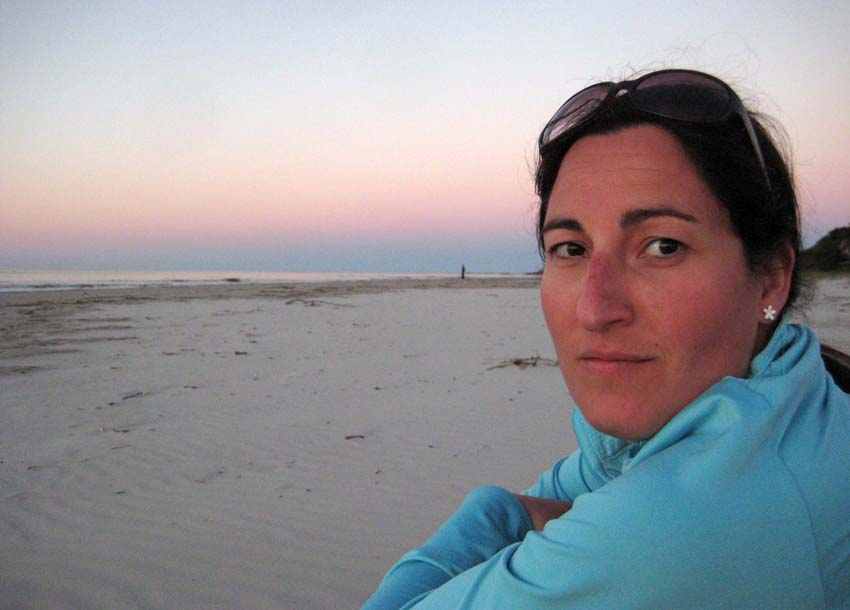Joseba Etxarri, Boise, ID. The truth is that she doesn’t stop. We met in 2004 when she came to Idaho to teach Spanish at the University of Idaho in Moscow, and later to work as an andereño at the Boise Ikastola. Two years later, she graduated with a Masters in Spanish Literature from the University of Washington and spent another year at the Boise Ikastola. She would then work nearly six years as NABO’s Euskera coordinator, along with chairperson Martin Goicoechea. Izaskun Kortazar Errekatxo is without a doubt a restless, dynamic and hard-working person. She has dreams and she pursues them until they become reality. She is sure that it is worth taking risks and working as hard as possible to attain what you want.
-You are a euskaldunberri
I learned Basque when I was thirteen, along with my sisters – we are triplets – Maitane and Estitxu. We went to summer Basque classes and the next year we attended school in Basque until we were fluent.
-In Euskadi, at a young age, you volunteered to work with prisoners.
Yes, as part of a Prison Ministry. There are prisoners who are allowed to go out but can’t. Our job was to run programs of reinsertion, show them how to spend their free time, and life in a positive way, and accompany them when they are first released when they were tested, before and after, for drug use. If it worked, later they use to leave to visit their families. Prisoners and those who have spent time in jail, in my opinion, are some of the most discriminated against in our society. People think “they must have done something and so deserve it,” and they are obliged to live a life that is far from decent, with many of their rights being restricted and being abused even after leaving prison. We are moved to other things, but not these other realities.
-You studied, let's say Teaching with an English minor…
But at the level of the language was what it was, meaning that after that I decided to spend one summer in Londo and two more in Scotland where I practiced English and also worked, in Scotland, at a restaurant, until I came to the United States.
-How did that happen?
I had read about the Ikastola in Boise when I was studying education, but I decided first to finish my studies. I taught Basque in Euskadi for four years but somehow I had a penchant for teaching Basque in places with less favorable learning conditions. I had always been attracted to the states. I was 26 and that year I applied for seven scholarships of which I was awarded three: one for London, that I declined, and two for Idaho, one to teach Spanish at the University of Idaho, Moscow, and another for the Ikastola. So I first went to Moscow and later went to the Ikastola in Boise; that was 2003-2004.
-Then you did a Masters and later you became the first Euskera Coordinator for NABO, the federation of Basque entities in the US.
I have always dreamed of teaching Basque in the US. Here they taught classes in various clubs and I proposed creating this figure to NABO. The idea was very well received. It was to systemize, and in some way unify and provide technical and teaching materials and assistance to those who were teaching, also to organize barnetegis, and give support to the teachers. I did that for six years and it was a truly wonderful experience. We opened new classes and energized others, we organized activities around Euskera like Korrika, Santa Agueda choirs, International Day of Euskera, and barnetegis, and what I think is equally important, we gave Euskera more visibility and prestige along with NABO and its activities.
-Today you teach at BSU
I combine my daily work of teaching Spanish with other tasks, like sharing Euskera and Basque culture as part of the Basque Studies Program at BSU and the Basque Museum. I think that it is important, in relation to Euskera and the Basque culture, to not limit our activities to Basque circles, but rather to share our culture with the American society.
-You have also found some time to recover activities that you were doing in Euskadi years ago.
Yes, I am beginning to collaborate with a jail regarding prisoner activities. And this summer I will revisit an idea that came to me before coming to the states. Even though I’ve been here for 12 years, I initially came thinking I would stay a year or two and then travel to Brazil. So, this summer I am going to volunteer in Brazil doing social work but also with the Basque community. I will be teaching some Basque classes with the Rio Grande do Sul Basque club.
-Is it easy today for a European to live and work legally in the US?
No. If you are not a student currently, or haven’t’ studied here before, it’s not easy.
-What advice would you give a young Basque that is thinking about going abroad?
I think that everyone has to find their own way, get to know themselves. There isn’t a sure recipe. But I would encourage people to travel, not only for economical reasons to fins a job, but to see, and to get to know and experience other cultures. Without a doubt I would encourage them to do that. When you travel, things happen to you that would never happen in Euskadi, if you stay you will miss out on a lot. I think that traveling and learning other languages is one of the most important investments that you can make in yourself.






 Send to a friend
Send to a friend Add comment
Add comment








